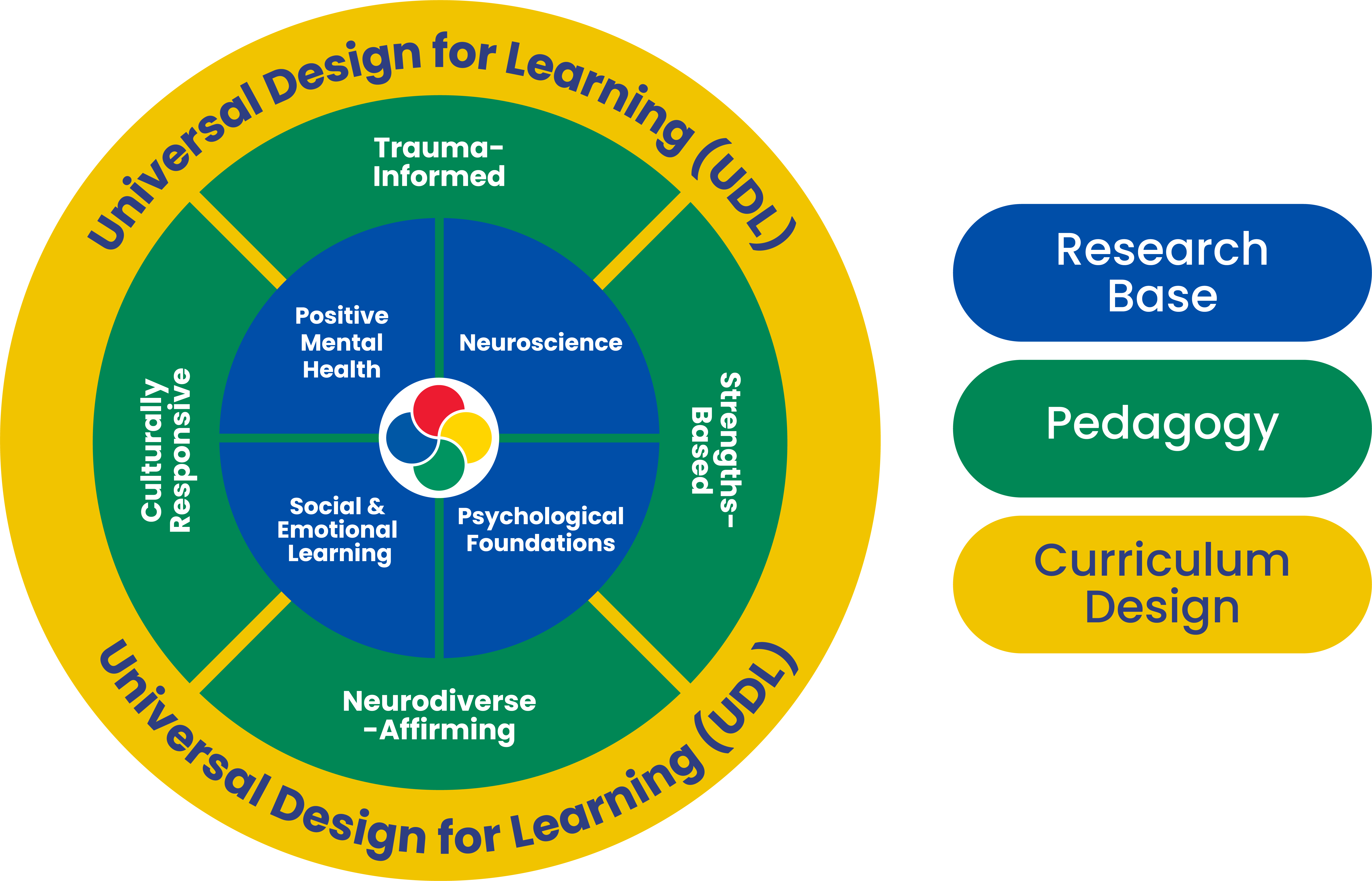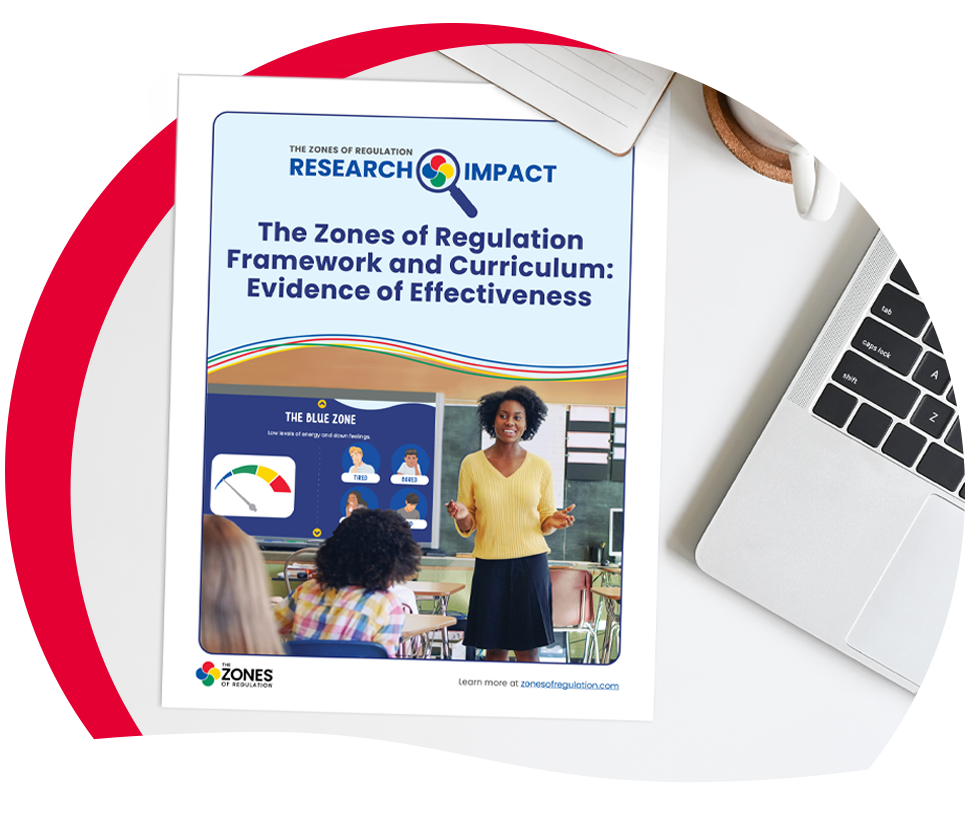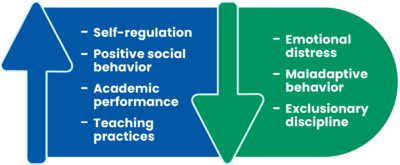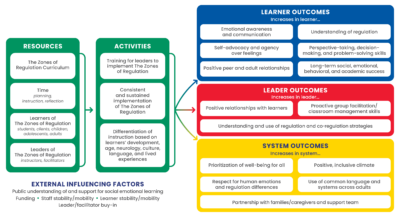Research


The Zones of Regulation framework and curriculum is based on years of applied experience by the author, Leah Kuypers. As an occupational therapist and autism specialist working in both clinical and educational settings, Leah saw the need for all learners to develop regulation skills. As a result, the solution to this need was conceived: The Zones of Regulation.
Research Base
The Zones of Regulation is research-based. The Zones of Regulation framework and curriculum was developed from foundational research and practices in the fields of social emotional learning, neuroscience, curriculum development, and psychological foundations.
The Zones of Regulation methodology and teaching approach is built upon foundational research and theory. We are committed to translating cutting-edge research into our products and services to ensure they are effective across learning environments and learner backgrounds. The development of The Zones framework and instructional design spans numerous research bases and theoretical foundations, including: Positive Mental Health, Neuroscience, Social Emotional Learning, and Psychological Foundations. Across these domains, we prioritize the use of equity-centered research, as learner experiences are situated within the context of their cultural identity, lived experiences, and sociopolitical environment.
Read more about how Best Practices were infused into the original Zones of Regulation curriculum.

Evidence of Effectiveness
The Zones of Regulation is evidence-based. Studies examining The Zones of Regulation’s impact have shown the curriculum has a positive effect on learner outcomes. Research is an integral part of what we do and we continue to devote efforts to furthering the depth and breadth of our evidence base. Our team collaborates with external partners to conduct rigorous research on The Zones of Regulation framework and curriculum. Prior research using the framework and curriculum has shown significant positive outcomes in educational and clinical settings. Across studies, research has shown the implementation of The Zones of Regulation framework and curriculum is associated with the following outcomes:

To learn more about findings from studies using The Zones of Regulation, view our Evidence of Effectiveness brief. This spreadsheet provides articles and manuscripts of completed research utilizing The Zones of Regulation framework and curriculum. Don’t see your manuscript or publication? Please submit it for review in this form, and we will be in touch soon!
Are you conducting research with The Zones of Regulation?
Please contact us at [email protected] if you are conducting a study utilizing The Zones of Regulation. In addition, we recommend using the Implementation and Fidelity Checklist to guide your work with the curriculum.
Read our Evidence of Effectiveness BriefContinuous Improvement
We’re responsive to users and committed to continuous improvement of The Zones of Regulation products and services to ensure we are making the greatest impact on learners. We partner with users of The Zones to gather feedback and make adjustments based on learner and leader experiences. Our prioritization of ongoing evaluation and continuous improvement allows us to gain a deep understanding of the real-world challenges faced by learners, leaders, and systems. As a result, our products and services are feasible to implement, compatible across environments, and relevant for learners.
Our Theory of Change
At The Zones of Regulation, we believe that regulation is essential for overall well-being and life success. Because of this, our mission is to empower learners of all ages to understand their feelings and emotions. Our mission is illustrated in our theory of change, which reinforces regulation as essential for positive social, emotional, behavioral, and academic development. Using an ecological systems lens, our theory of change recognizes that learner experiences are situated within the context of their cultural identity, lived experiences, and sociopolitical environment. By teaching the essential components for regulation, we believe all learners can acquire the essential skills and competencies to develop positive social, emotional, behavioral, and academic outcomes.

Funding The Zones of Regulation
We are committed to assisting users with accessing funding for The Zones of Regulation. The Zones of Regulation programs and services meet federal funding eligibility standards and other state and local grant requirements. Educators and clinicians are encouraged to use the following resources to help secure funds to purchase and implement The Zones of Regulation.
Federal & State Funding Sources
Discretionary or Competitive Funding (awarded through an application at the federal or state level)
- Project AWARE (Advancing Wellness and Resiliency in Education)
- Education Innovation and Research (EIR) Program
Formula Funding (no application process, funds allocated to pre-selected recipients)
- IDEA Part B—Grants to States Program
- Title I, Part A—Improving Basic Programs Operated by Local Educational Agencies
- Title I, Part C—Migrant Education Program State Grants
- Title I, Part D—Prevention and Intervention Programs for Children and Youth Who Are Neglected, Delinquent, or At-Risk
- Title II, Part A—Supporting Effective Instruction State Grants
- Title VI, Part A–Student Support and Academic Enrichment Grants
- Title VI, Part B—Rural Education Achievement Program
Local Funding Sources
Community foundations, local businesses, and service organizations offer opportunities to fund initiatives. Applicants typically complete a competitive application to access funds. For a list of local funding opportunities, visit Fundsnet Services, a database of private funding by state.
Other Resources
- Grants.gov lists formula funding and discretionary grant opportunities from 26 federal agencies.
- Forecast of Funding is a database of programs and competitions for the Department of Education.
- Greenlights Grant Initiative offers webinars and tutorials for how to access federal grants, including lists of grant opportunities and grant writing support.
For More Information
Contact us at [email protected]
Study Title
Using Technology to Enhance Sensory-Based Interventions (2021)
Institution/Organization
N/A
Authors
Piller, A., Del Pilar Saa, M., Tremino, I., Koester, A. C., & Duker, L. S.
Quick Description
Journal Article: Article lists The Zones of Regulation Apps in “Examples of of Apps to Promote Sensory-Related Wellness” and utilized The Zones of Regulation App as an intervention in case study of 8 year-old with ASD.
Publication
AJOT SIS Quarterly Practice Connections, Vol 6 (1), 2-4
Quick Description
Restricted Access through AJOT https://research.aota.org/ajot
Citation
Piller, A., Del Pilar Saa, M., Tremino, I., Koester, A. C., & Duker, L. S. (2021). Using technology to enhance sensory-based interventions. SIS Quarterly Practice Connections, 6(1), 2–4.
Study Title
Developing Self-Regulation in Children with FASD Using the Zones of Regulation (2021)
Institution/Organization
University of Washington, WA
Authors
Anderson, S., Bartholow, B., Snow, J., Stratiner, M., Nash, J., & Jirikowic, T.
Quick Description
Journal Article: Clinical intervention with children ages 8-11 with Fetal Alcohol Spectrum Disorder (FASD) using The Zones lessons adapted for students with FASD, includes recommendations.
Publication
AOTA SIS Quarterly Practice Connections, 2(4), 5–7.
Quick Description
Restricted Access through AJOT: https://research.aota.org/ajot
Citation
Anderson, S., Bartholow, B., Snow, J., Stratiner, M., Nash, J., & Jirikowic, T. (2017). Developing self-regulation in children with FASD using the Zones of Regulation. SIS Quarterly Practice Connections, 2(4), 5–7.
Study Title
Collaborative Development of a Social-Emotional Skills Development Curriculum for Children Who Are Deaf (2020)
Institution/Organization
California School for the Deaf Fremont (CDS Fremont), CA
Authors
Domenique Embrey, Tiffany Wilson, and Courtney Hipskind
Quick Description
Journal Article: Adapted preschool SEL intervention program for children who are deaf/hard of hearing (D/HH), focused on SEL and sensory processing using The Zones framework.
Publication
AOTA SIS Quarterly Practice Connections, 5(1), 7–10
Quick Description
Restricted Access through AJOT https://research.aota.org/ajot
Citation
Embrey, D., Wilson, T., & Hipskind, C. (2020). Collaborative development of a social-emotional skills development curriculum for children who are Deaf. SIS Quarterly Practice Connections, 5(1), 7–10.
Study Title
A Feasibility Study of The Zones of Regulation® curriculum as part of Tier I MTSS, POSTER (2018, updated 2020)
Institution/Organization
Tufts University, MA
Authors
Erin McQuaid
Quick Description
Poster Session: General education Tier-1 instruction using The Zones of Regulation with 4th grade class in Elementary School setting.
Publication
AJOT: Vol. 72
Quick Description
Restricted Access through AJOT: https://research.aota.org/ajot
Citation
Erin McQuaid; Feasibility Study: Implementing the Zones of Regulation® Curriculum at a Whole-Class Level. Am J Occup Ther 2018;72(4_Supplement_1):7211505083. https://doi.org/10.5014/ajot.2018.72S1-PO1014
Study Title
Self-Regulation in the Classroom: An Action Research Study (2020)
Institution/Organization
Vancouver Island University, Canada
Authors
Jaime Woodford
Quick Description
Action Research Thesis: General education Tier-1 instruction in Grade 1-2 class in Elementary Setting.
Publication
University Publication
Quick Description
https://viurrspace.ca/handle/10613/2319
Citation
Woodford, Jaime. Self-Regulation in the Classroom: An Action Research Study. (2020). Vancouver Island University. https://citeseerx.ist.psu.edu/viewdoc/download?doi=10.1.1.863.1177&rep=rep1&type=pdf
Study Title
Brevard Public Schools School Safety and Climate Study (2020)
Institution/Organization
University of Central Florida (UCF), U.S. Dept of Justice
Authors
Kristina K. Childs; Sara L. Bryson; Jennifer H. Peck; Kim Gryglewicz; Roberto H. Potter
Quick Description
Large Scale Study: Research conducted in 5 schools as part of a comprehensive mental health intervention focused on increasing school safety in schools with significant disciplinary disparities. The Zones of Regulation was the chosen intervention for 62% of students receiving this intervention.
Publication
Office of Justice Programs’ National Criminal Justice Reference Service
Quick Description
Citation
Childs; Bryson; Peck; Gryglewicz; Potter. "Brevard Public Schools School Safety and Climate Study (2020). Office of Justice Programs’ National Criminal Justice Reference Service retrieved from https://www.ojp.gov/library/publications/brevard-public-schools-schoolsafety-and-climate-study-final-summary-overview
Study Title
The Impact of a Social Emotional Learning Curriculum on the Social-Emotional Competence of Elementary-Age Students (2019)
Institution/Organization
Clemson University, SC
Authors
Michelle Dunn
Quick Description
Dissertation: Large-scale study of implementing The Zones of Regulation in general education Tier-1 instruction in twelve 2nd grade classrooms from three socioeconomically diverse Elementary Schools.
Publication
University Publication
Quick Description
Open Access Link: https://tigerprints.clemson.edu/cgi/viewcontent.cgi?article=3461&context=all_dissertations
Citation
Dunn, Michelle, "The Impact of a Social Emotional Learning Curriculum on the Social-Emotional Competence of Elementary-Age Students" (2019). All Dissertations. 2457. https://tigerprints.clemson.edu/all_dissertations/2457
Study Title
Increasing Self-Regulation for ADL Independence in Children: Feasibility Study and Coregulation Curriculum Description POSTER (2019)
Institution/Organization
Western Michigan University, MI
Authors
Michelle Suarez, Ben Atchison, Elsie Bush
Quick Description
Poster Session: Clinical focus group of children ages 6-14 with regulatory issues utilizing The Zones of Regulation to increase independence in Activities of Daily Living (ADLs).
Publication
AJOT: Vol. 73 Iss. 4
Quick Description
Restricted access through AJOT: https://research.aota.org/ajot
Citation
Michelle Suarez, Ben Atchison, Elsie Bush; Increasing Self-Regulation for ADL Independence in Children: Feasibility Study and Coregulation Curriculum Description. Am J Occup Ther 2019;73(4_Supplement_1): 7311520407. https://doi.org/10.5014/ajot.2019.73S1-PO3024
Study Title
Blue–Yellow–Red–Green: Teaching Self-Regulation Skills to First Graders (2019)
Institution/Organization
The School Association for Special Education (SASED), IL
Authors
Christa Valkanos, Cheryl Huber-Lee, and Susan M. Cahill
Quick Description
Journal Article: Whole-class instruction using The Zones of Regulation curriculum in two 1st Grade classrooms in 15 weekly 30 min. sessions. Includes case examples.
Publication
AOTA OT Practice, 21(12), 7–11.
Quick Description
Restricted Access through AJOT: https://research.aota.org/ajot
Citation
Valkanos, C., Huber-Lee, C., & Cahill, S. M. (2016). Blue–yellow–red–green: Teaching self-regulation skills to first graders. OT Practice, 21(12), 7–11.
Study Title
Trauma-Responsive Practice in Baltimore City Public Schools: Humane Education (2019)
Institution/Organization
Baltimore City Public Schools, Project Mickey, MD
Authors
Jennifer Ganz
Quick Description
Journal Article: Intervention utilizing adapted Zones of Regulation check-in within humane/animal therapy with children with trauma histories in a Elementary Setting.
Publication
Protocol, Volume LIX, Issue 3, 4-5
Quick Description
Restricted Access through Maryland School Psychologists’ Association MSPA: https://www.mspaonline.org/
Citation
Ganz, Jennifer. (2019). Trauma-Responsive Practice in Baltimore City Public Schools: Humane Education (2019). Protocol, Volume LIX, Issue 3, 4-5.
Study Title
Harmonizing Social Emotional Learning for Students with Special Needs (2019)
Institution/Organization
Dominican University of California
Authors
Deema Shihadih
Quick Description
Thesis: Music therapy intervention for elementary learners with intellectual disabilities, combining components of The Zones of Regulation with components of the PATHs curriculum.
Publication
University Publication
Quick Description
https://scholar.dominican.edu/cgi/viewcontent.cgi?article=1004&context=education-masters-theses
Citation
Shihadih, Deema, "Harmonizing Social Emotional Learning for Students with Special Needs" (2019). Master of Science in Education | Master's Theses. 5. https://doi.org/10.33015/dominican.edu/2019.EDU.04
Study Title
Effectiveness of Components of the Zones of Regulation on Student Behaviors (2019)
Institution/Organization
Minot State University, ND
Authors
Marti Quale
Quick Description
Thesis: Intervention in school setting using components of The Zones of Regulation with 2nd/3rd grade students with ASD & ADHD diagnoses focused on participation and compliance in classroom.
Publication
ProQuest
Quick Description
Citation
Quale, M. (2019). Effectiveness of components of the zones of regulation on student behaviors (Order No. 22622385). Available from Publicly Available Content Database. (2306303699). Retrieved from https://search.proquest.com/dissertations-theses/effectivenesscomponents-zones-regulationon/docview/2306303699/se-2?accountid=143111
Study Title
Efficacy Study of a Social Communication and Self-Regulation Intervention for School-Age Children With Autism Spectrum Disorder: A Randomized Controlled Trial (2019)
Institution/Organization
University of North Carolina (UNC) Chapel Hill, NC
Authors
Sallie W. Nowell, Linda R. Watson, Brian Boyd, and Laura G. Klinger
Quick Description
Peer Reviewed Journal Article Assessed efficacy of a parent-assisted 12-week group intervention for 1st and 2nd graders with ASD targeting social-communication and self-regulation skills for students and competency for parents using Zones of Regulation and Social Thinking concepts and lessons combined with TEACHH program.
Publication
LSHSS Journal Online: Vol. 50 Iss.3
Quick Description
Link to Abstract: https://pubs.asha.org/doi/10.1044/2019_LSHSS-18-0093
Citation
Nowell, S. W. (2018). Social-communication and self-regulation development in children with autism spectrum disorder (Order No. 10789360). Available from Health Research Premium Collection; Nursing & Allied Health Premium. (2059393069). Retrieved from https://search.proquest.com/dissertations-theses/social-communicationself-regulation-development/docview/2059393069/se-2?accountid=143111
Study Title
Teacher Perceptions of Effectiveness of the Zones of Regulation (2019)
Institution/Organization
Southern Connecticut State University
Authors
Karli Kisiel
Quick Description
Thesis: Teacher perception study at elementary school implementing The Zones of Regulation schoolwide.
Publication
ProQuest
Quick Description
Citation
Kisiel, Karli. (2019). Teacher Perceptions of Effectiveness of the Zones of Regulation. Thesis Southern Connecticut State University. Retrived from https://pubs.asha.org/doi/10.1044/2019_LSHSS-18-0093
Study Title
Increasing Self-Monitoring Effectiveness Using Heart Rate Zone Notifications and The Zones of Regulation® (2018)
Institution/Organization
University of Cincinnatti, OH
Authors
Jamie Jones
Quick Description
Dissertation: Intervention with students grades 1-3 in Alternative School setting for students identified with EBD, combined instruction using selected Zones of Regulation lessons along with smartwatch heart monitors focused on self-monitoring to increase on-task behavior.
Publication
University Publication
Quick Description
Open Access Link: https://etd.ohiolink.edu/apexprod/rws_etd/send_file/send?accession=ucin1562059964659066&disposition=inline
Citation
Jones, J. (2019). Increasing Self-Monitoring Effectiveness Using Heart Rate Zone Notifications and The Zones of Regulation. (Electronic Thesis or Dissertation). Retrieved from https://etd.ohiolink.edu/
Study Title
Transforming Traumatised Children within NSWDepartment of Education Schools: One SchoolCounsellor’s Model for Practise – REWIRE (2017)
Institution/Organization
New South Wales Department of Education, Aus
Authors
Deborah A. Costa
Quick Description
Journal Article: Counselor-led wellness program using the REWIRE Model that includes 17 weeks of whole-class Zones of Regulation, focused on increasing capacity and connection for children who are victims of maltreatment and/or trauma.
Publication
Children Australia Volume 42 Number 2 pp. 113–126
Quick Description
https://search.proquest.com/docview/1910234712?pqorigsite=gscholar&fromopenview=true
Citation
Costa, Deborah A . Transforming Traumatised Children within NSW Department of Education Schools: One School Counsellor's Model for Practise - REWIRE. Children Australia; Melbourne Vol. 42, Iss. 2, (Jun 2017): 113-126. DOI:10.1017/cha.2017.14
Study Title
The Efficacy of Zones of Regulation in Teaching Grade 3 and 4 Students Self- Regulation Skills (2017)
Institution/Organization
City University of Seattle, WA
Authors
Kelly Munro
Quick Description
Thesis: Implementation of Tier-1 Zones of Regulation instruction in 3rd and 4th grade classroom using observations and journaling focused on self-awareness.
Publication
University Publication
Quick Description
Open Access Link: http://repository.cityu.edu/handle/20.500.11803/650
Citation
Munro, Kelly (2017). The Efficacy of Zones of Regulation in Teaching Grade 3 and 4 Students Self-Regulation Skills. (Thesis, City University of Seattle, WA) Retrieved from http://repository.cityu.edu
Study Title
The Use of the Zones of Regulation® in an Elementary School: Student and Teacher Perceptions (2016)
Institution/Organization
Elizabethtown College, PA
Authors
Carly Mutter
Quick Description
Thesis: Data collection and perception data in elementary school implementing Zones of Regulation schoolwide, sampled 5 students from each classroom in school using multiple measurements.
Publication
University Publication
Quick Description
Open Access Link: https://jayscholar.etown.edu/cgi/viewcontent.cgi?article=1009&context=otstu
Citation
Mutter, Carly, "The Use of the Zones of Regulation® in an Elementary School: Student and Teacher Perceptions" (2016). Occupational Therapy: Student Scholarship & Creative Works. 7. https://jayscholar.etown.edu/otstu/7
Study Title
Zones of Regulation® for Preschool Students: An Intensive Skills Training Intervention Model (2015)
Institution/Organization
University of Cincinnatti, OH
Authors
Kayley Sanger
Quick Description
Dissertation: Intervention with preschoolers with identified behavioral concerns in an Early Childhood setting using adapted version of The Zones of Regulation in 6-weeks of biweekly instruction, followed by incidental teaching/prompt training for generalization.
Publication
University Publication
Quick Description
Open Access Link: https://etd.ohiolink.edu/apexprod/rws_etd/send_file/send?accession=ucin1595847029142493&disposition=inline
Citation
Sanger, K. (2020). Zones of Regulation® for Preschool Students: An Intensive Skills Training Intervention Model. (Electronic Dissertation, University of Cincinnatti Ohio). Retrieved from https://etd.ohiolink.edu/
